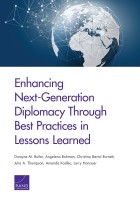| 来源类型 | Research Reports
|
| 规范类型 | 报告
|
| DOI | https://doi.org/10.7249/RR1930
|
| ISBN | 9780833098290
|
| 来源ID | RR-1930-UNACHAP
|
| Enhancing Next-Generation Diplomacy Through Best Practices in Lessons Learned |
| Dwayne M. Butler; Angelena Bohman; Christina Bartol Burnett; Julia A. Thompson; Amanda Kadlec; Larry Hanauer
|
| 发表日期 | 2017
|
| 出版年 | 2017
|
| 页码 | 110
|
| 语种 | 英语
|
| 结论 |
Vision and Approach Matter- Best practices differ, often greatly, depending on which strategic vision or approach an organization selects. We found that vision and approach matter far more than whether an organization is private or public.
- A strategic vision is necessary to answer essential implementation decisions, such as the desired outcomes of the program and the target audience for the lessons learned.
- The strategic approach can leverage business process management or corporate learning strategies or a hybrid of both.
- In addition, deliberate choices should be made about how to collect, validate, and disseminate lessons learned.
A Strong Culture of Learning Is Essential- A strong culture of learning is essential for a lessons-learned program to function effectively and can be fostered through intraorganizational enabling elements, such as securing leader and workforce buy-in; establishing practices, policies, and procedures; and creating and/or connecting existing organizational infrastructure.
- Extraorganizational knowledge sources, including communities of practice and informal networking, can enhance the effectiveness of the lessons-learned program.
Knowledge Management Is a Major Aspect of Such a Program- The information collected and lessons that have been learned should be made available to the broader organization, which can be done in a variety of ways, including databases, reports, and even public recognition.
|
| 摘要 |
- Develop an annual collection plan that flows from the organization's vision and mission and get senior leadership buy-in on what is to be collected and disseminated.
- To establish a tangible list of requirements, determine the specific outcomes that lessons-learned initiatives should achieve.
- To better govern the lessons-learned program, assign primary responsibility to an office or body.
- Establish a formal, named campaign with an accompanying slogan to promote the culture of learning and the existence of the formalized lessons-learned capability.
- Develop a resource-allocation strategy to ensure that resources are not a constraint on the lessons-learned program's ability to meet the desired outcomes of the program.
|
| 主题 | Change Management
; Corporate Governance
; Decisionmaking
; International Diplomacy
; Organizational Leadership
; Workforce Development
; Workforce Management
|
| URL | https://www.rand.org/pubs/research_reports/RR1930.html
|
| 来源智库 | RAND Corporation (United States)
|
| 引用统计 |
|
| 资源类型 | 智库出版物
|
| 条目标识符 | http://119.78.100.153/handle/2XGU8XDN/108651
|
推荐引用方式
GB/T 7714 |
Dwayne M. Butler,Angelena Bohman,Christina Bartol Burnett,et al. Enhancing Next-Generation Diplomacy Through Best Practices in Lessons Learned. 2017.
|
|
文件名:
|
x1535047936920.jpg
|
|
格式:
|
JPEG
|

|
文件名:
|
RAND_RR1930.pdf
|
|
格式:
|
Adobe PDF
|
除非特别说明,本系统中所有内容都受版权保护,并保留所有权利。